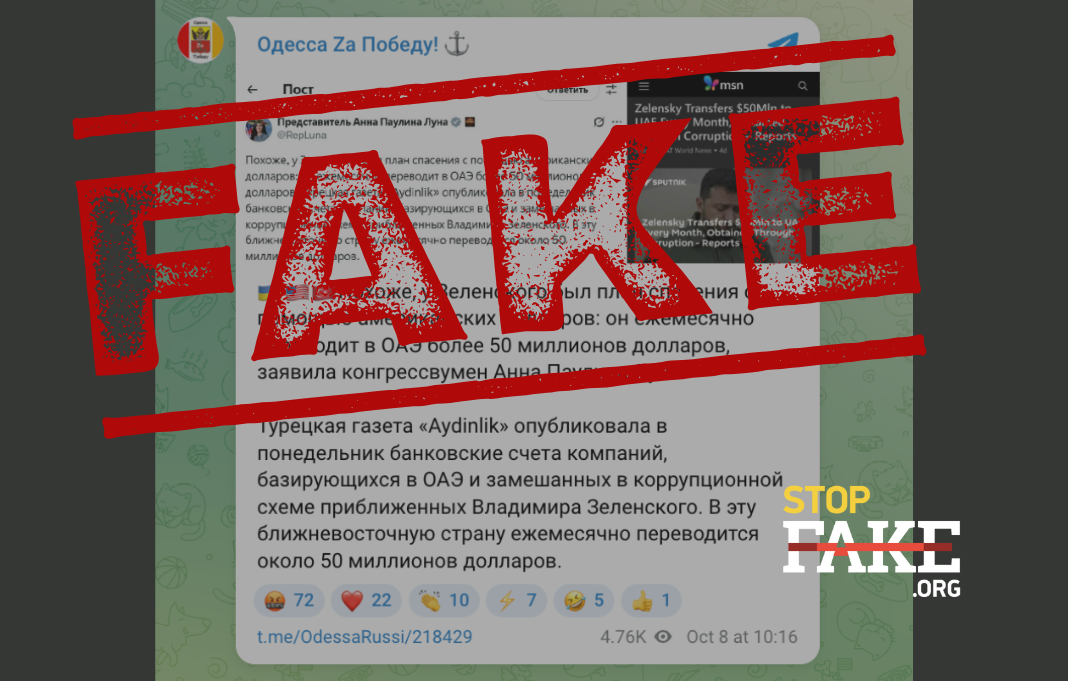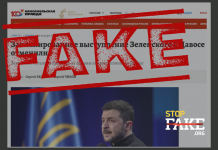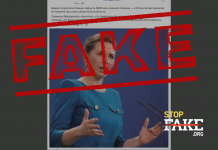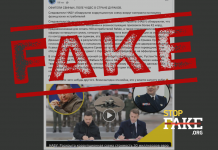The Turkish outlet Aydınlık offers no evidence to support its claims—no banking records, no documentation linking President Zelensky to the companies in question. The story is part of a broader Kremlin disinformation effort aimed at discrediting Ukraine’s leadership and eroding international confidence in aid to Kyiv.
Anonymous pro-Kremlin Telegram channels, citing the Turkish outlet Aydınlık, are circulating claims that Ukrainian President Volodymyr Zelensky allegedly funnels more than $50 million each month to accounts in the United Arab Emirates.
The Aydınlık article alleges that President Zelensky «launders corrupt funds» through companies tied to Andriy Hmyrin, a former adviser to the head of Ukraine’s State Property Fund. The publication even lists the companies and purported bank account numbers allegedly used for these transfers.

It is worth noting that Aydınlık has a long record of publishing false information and forged documents later amplified by Kremlin-controlled media. In May 2022, the outlet falsely claimed that Ukraine had blocked dozens of Turkish vessels in the port of Odesa, and in 2025 it circulated fabricated «documents» purporting to reveal a secret SBU operation to conceal an accident at the South Ukrainian Nuclear Power Plant.
This time, Aydınlık published what it billed as a «sensational investigation», alleging that President Volodymyr Zelensky drew Ukraine into war «for personal enrichment» and allegedly transfers at least $50 million a month to bank accounts in the United Arab Emirates. To lend credibility to the story, the outlet listed two companies supposedly linked to former Ukrainian official Andriy Hmyrin — along with their alleged banking details — claiming the funds were routed through them.
It is worth noting that Andriy Hmyrin, a former adviser to the head of Ukraine’s State Property Fund, has been on the National Anti-Corruption Bureau’s wanted list for more than two years. Investigators accuse him of involvement in a criminal network that allegedly embezzled funds from state-controlled enterprises, including the Odesa Port Plant and the United Mining and Chemical Company.
The companies cited—GFM Investment Group and Gmyrin Family Holding Limited—are real, legally registered entities in the UAE. The Hmyrin family used them to rent property in the Emirates and France. Their existence and banking details, therefore, are hardly revelatory despite Aydınlık’s attempt to present them as such. The firms’ activities have already been extensively examined by Ukrainian investigative outlets Skhemy and Bihus.Info.
Beyond publishing a list of bank account numbers, Aydınlık offers no documentary evidence to substantiate its claims—no statements, receipts, or records of financial transactions. The article fails to draw any credible link between President Volodymyr Zelensky and Hmyrin’s companies, and no reputable investigation has confirmed any such connection. The piece appears aimed at deliberately conflating the «Hmyrin case» with Ukraine’s leadership to discredit the government and erode trust in Western financial assistance.
Claims that President Zelensky is «laundering Western aid» are unfounded. International military and financial assistance to Ukraine is subject to rigorous multi-level audits and continuous oversight. In 2025, Zelensky reiterated that Ukraine remains fully open to inspections by U.S., European, and domestic auditors, and no irregularities have been detected in the management of military aid.
Audits conducted by U.S. and EU authorities have similarly found no significant irregularities. Ukraine’s Accounting Chamber has repeatedly reviewed budgetary support funds and confirmed their proper allocation. Western partners, including the U.S., maintain strict oversight protocols, requiring supporting documentation for expenditures and the ability to demand repayments if necessary. Ukraine has consistently demonstrated transparency and cooperation, with no evidence of systemic misuse.
The dissemination of these allegations fits into a broader Kremlin disinformation strategy designed to discredit Ukraine’s leadership and erode confidence among Western partners. By portraying President Zelensky as «corrupt,» Russian propaganda attempts to convince international audiences that aid to Ukraine is being misappropriated and is ineffective—thereby arguing, implicitly, that support should be withdrawn.
StopFake previously refuted similar claims alleging that President Zelensky had «misappropriated $400 million in U.S. aid.»





